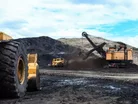Rio Tinto's iron ore Q2 shipments reach 88.5 million tonnes

One of the world’s leading mining companies has released its second quarter results, and its iron ore production has skyrocketed.
Rio Tinto announced in its Q2 results that its iron ore shipments were 14% higher than they were in the same quarter last year, rising up to 88.5 million tonnes through to June 2018;
This increase has also had an affect on the company’s projected 2018 iron ore shipment guidance, with Rio Tinto anticipating somewhere between 330 to 340 tonnes by the end of 2018.
What is the secret to this success?
Rather modestly, the company has pointed to better weather which in turn has resulted in a system wide boost in productivity.
Rio Tinto chief executive J-S Jacques said “Operational performance was solid across most commodities, rounding out a strong first half performance for the Group. Our increasingly flexible Pilbara iron ore system continued to perform well.”
Related stories:
Rio Tinto completes first autonomous train shipment for AutoRail programme
Rio Tinto enters Joint Venture with China Minmetals Corporation
Rio Tinto completes $300 million sale of Winchester South coal mine
Of course its not just iron ore. Rio Tinto also reported a 3% increase in bauxite production (13.3 million tonnes) with a further increase of third party shipments (8.7 million tonnes.)
Looking at copper production, 156.8 thousand tonnes represented a 26% increase, with Escondida noted for its strong production levels.
“Our bauxite and copper businesses also delivered strong operating results, demonstrating the success of our ongoing mine-to-market productivity programme, which is increasingly important in an environment of rising cost inflation. Our sustained focus on cash generation, combined with disciplined capital allocation, will ensure we continue to deliver superior returns to our shareholders across the short, medium and long term,” added Jacques.
- Who is Rio Tinto’s New Chief Executive Officer Simon Trott?Operations
- Rio Tinto to Acquire Arcadium Lithium for $6.7bnSupply Chain & Operations
- Rio Tinto, BHP & Glencore 'Feeling the Pinch on Copper'Supply Chain & Operations
- Focus on: Nickel, a key metal in the EV revolutionSupply Chain & Operations



